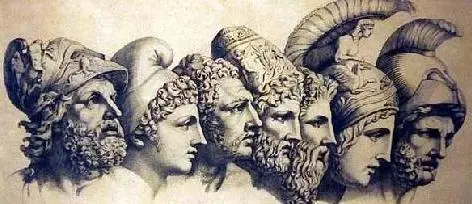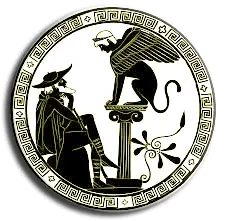| Nature |  | Άπας ό βίος των ανθρώπων φύσει και νόμοις διοικείται. The human life is governed by nature and laws. — Aristotle, 384-322 BC, Ancient Greek philosopher |  | Κατά νόμον είναι πολλούς Θεούς, κατά δε φύσιν ένα. According to law, there are many gods; according to nature, only one. — Antisthenes, 445-360 BC, Ancient Greek Cynic philosopher |  | Η φύσις μηδέν μήτε ατελές ποιεί μήτε μάτην. Nature does nothing without purpose or in vain. — Aristotle, 384-322 BC, Ancient Greek philosopher |  | Εν πάσι γαρ τοις φυσικοίς ενεστί τι θαυμαστόν. In all things of nature there is something of the marvelous. — Aristotle, 384-322 BC, Ancient Greek philosopher |  | Η φύσις ουδέν ποιεί άλματα. Nature does not make leaps. — Aristotle, 384-322 BC, Ancient Greek philosopher |  | Ουκ έστι χείρων ουδεμία φύσις τέχνης. Και γαρ αι τέχναι τας φύσεις μιμούνται. No form of Nature is inferior to Art. For the arts merely imitate natural forms — Marcus Aurelius, 121-180 AD, Roman Emperor ‐ Meditations XI, 10 |  | Φύσις κρύπτεσθαι φιλεί. Nature is wont to hide herself. — Heraclitus, 544-484 BC, Ancient Greek philosopher |  | Ουδέν άτακτον των φύσει. Nothing given by nature is without order. — Aristotle, 384-322 BC, Ancient Greek philosopher | | | |
|
|
|
| Sun |  | Ο ήλιος, καθάπερ ο Ηράκλειτος φησι, νέος εφ’ ημέρη εστίν. The sun, as Heraclitus says, is new every day. — Heraclitus, 544-484 BC, Ancient Greek philosopher |  | Ήλιος ουκ αν υπερβήσεται μέτρα. Even the sun will not overstep its bounds. — Heraclitus, 544-484 BC, Ancient Greek philosopher |  | Ο ήλιος εις τους αποπάτους, αλλ’ ου μιαίνεται. The sun shines even on latrines but is not defiled. — Diogenes, 410-323 BC, Ancient Greek Cynic philosopher | | | |
|
|
|
|
| Night |  | Τον πυθόμενον τι πρότερον γεγόνοι, νυξ η ημέρα, «η νυξ,» έφη, «μια ημέρα πρότερον.» To the question, “What came first, night or day?” “Night,” he said, “by one day.” — Thales of Miletus, 643-548 BC, Ancient Greek philosopher |  | Κλεπτών γαρ η νυξ, της δ’ αληθείας το φως. Night is for the thieves, light is for the truth. — Euripides, 480-406 BC, Ancient Greek tragedian ‐ Iphigeneia in Tauris |  | Άνθρωπος εν ευφρόνη φάος άπτεται εαυτώ αποσβεσθείς. Man turns on the light at night while he himself is turned off. — Heraclitus, 544-484 BC, Ancient Greek philosopher | | | |
|
|
| Fire |  | Κόσμον τονδε, τον αυτόν απάντων, ούτε τις θεών ούτε ανθρώπων εποίησεν, αλλ' ην αεί και έστιν και έστε πύρ αείζωον. This world, which is the same for all, has not been made by any god or man, but it always has been, is, and will be an ever-living fire. — Heraclitus, 544-484 BC, Ancient Greek philosopher |  | Πυρ μαχαίρα μη σκαλεύειν. Poke not the fire with a sword. — Pythagoras, 580-490 BC, Ancient Greek philosopher | | | |
|
|
|
|
|
|
|
|


